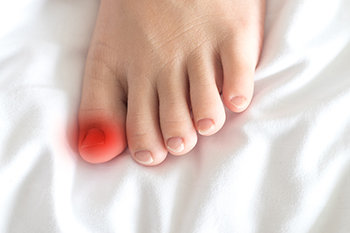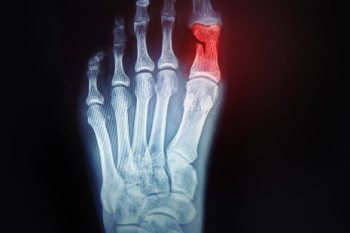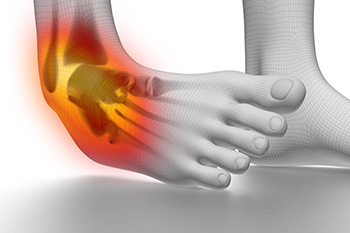
An ingrown toenail occurs when the edge of the nail grows into the surrounding skin, leading to pain, redness, swelling, and sometimes infection. Common causes include wearing poor footwear that places pressure on the toes, irregularly shaped nails, toenail thickening, and improper trimming techniques. This condition can become more severe if left untreated, making walking uncomfortable and increasing the risk of complications. A podiatrist can safely remove the ingrown portion of the nail, treat infections, and provide guidance on proper trimming and footwear to prevent recurrence. If you have discomfort or signs of infection from an ingrown toenail, it is strongly suggested that you schedule an appointment with a podiatrist for expert treatment and lasting relief.
Ingrown toenails can become painful if they are not treated properly. For more information about ingrown toenails, contact Gerard Skaziak, DPM of Lakeview Family Foot Care. Our doctor can provide the care you need to keep you pain-free and on your feet.
Ingrown Toenails
Ingrown toenails occur when a toenail grows sideways into the bed of the nail, causing pain, swelling, and possibly infection.
Causes
- Bacterial infections
- Improper nail cutting such as cutting it too short or not straight across
- Trauma to the toe, such as stubbing, which causes the nail to grow back irregularly
- Ill-fitting shoes that bunch the toes too close together
- Genetic predisposition
Prevention
Because ingrown toenails are not something found outside of shoe-wearing cultures, going barefoot as often as possible will decrease the likeliness of developing ingrown toenails. Wearing proper fitting shoes and using proper cutting techniques will also help decrease your risk of developing ingrown toenails.
Treatment
Ingrown toenails are a very treatable foot condition. In minor cases, soaking the affected area in salt or antibacterial soaps will not only help with the ingrown nail itself, but also help prevent any infections from occurring. In more severe cases, surgery is an option. In either case, speaking to your podiatrist about this condition will help you get a better understanding of specific treatment options that are right for you.
If you have any questions, please feel free to contact our offices located in Guntersville and Albertville, AL . We offer the newest diagnostic and treatment technologies for all your foot care needs.

Broken toes can cause significant discomfort and limit mobility. Toe fractures usually occur from stubbing the toe, dropping something heavy on the foot, or sustaining a sports-related impact. Symptoms include swelling, bruising, and pain when walking or applying pressure. Diagnosis is confirmed through an exam and imaging to assess the extent of the fracture and determine if the bone is displaced. Stable, nondisplaced fractures may be managed with protective footwear to reduce movement and pressure, while displaced fractures often require a procedure to realign the bone. Fractures of the big toe tend to be more serious due to this toe’s role in balance and walking. Big toe injuries may require stabilization or even surgery if the damage is severe. A podiatrist can provide a proper diagnosis, realignment, and supportive devices to promote healing and prevent long-term complications. If you are experiencing pain from a broken toe, it is suggested that you make an appointment with a podiatrist for an exam, diagnosis, and treatment.
A broken toe can be very painful and lead to complications if not properly fixed. If you have any concerns about your feet, contact Gerard Skaziak, DPM from Lakeview Family Foot Care. Our doctor will treat your foot and ankle needs.
What to Know About a Broken Toe
Although most people try to avoid foot trauma such as banging, stubbing, or dropping heavy objects on their feet, the unfortunate fact is that it is a common occurrence. Given the fact that toes are positioned in front of the feet, they typically sustain the brunt of such trauma. When trauma occurs to a toe, the result can be a painful break (fracture).
Symptoms of a Broken Toe
- Throbbing pain
- Swelling
- Bruising on the skin and toenail
- The inability to move the toe
- Toe appears crooked or disfigured
- Tingling or numbness in the toe
Generally, it is best to stay off of the injured toe with the affected foot elevated.
Severe toe fractures may be treated with a splint, cast, and in some cases, minor surgery. Due to its position and the pressure it endures with daily activity, future complications can occur if the big toe is not properly treated.
If you have any questions, please feel free to contact our offices located in Guntersville and Albertville, AL . We offer the newest diagnostic and treatment technologies for all your foot care needs.

Custom orthotics can be used to relieve foot pain and discomfort. They're also used to treat various foot conditions and deformities. Flat feet, bunions, and Morton's neuroma are just a few of the foot conditions that have been known to benefit from the use of orthotics.
Comfy feet are happy feet! Contact us today.

A sprained ankle occurs when the ligaments that support the joint are stretched or torn, often after rolling or twisting the foot. This injury is common during sports, running on uneven ground, or even simple daily activities like stepping off a curb. Symptoms usually begin with sudden pain around the ankle, which may be followed by swelling, bruising, and in more severe cases, difficulty placing weight on the foot. Instability can also develop, making it feel like the ankle might give way when standing or walking. Most ankle sprains affect the outer side of the ankle, though the inner side or the area just above the joint can be involved as well. A podiatrist can examine the ankle, order imaging if needed, and recommend the right treatment plan to restore stability and function. If you have symptoms of a sprained ankle, it is suggested that you make an appointment with a podiatrist for an exam, diagnosis, and treatment, which may include immobilization.
Although ankle sprains are common, they aren’t always minor injuries. If you need your ankle injury looked at, contact Gerard Skaziak, DPM from Lakeview Family Foot Care. Our doctor can provide the care you need to keep you pain-free and on your feet.
How Does an Ankle Sprain Occur?
Ankle sprains are the result of a tear in the ligaments within the ankle. These injuries may happen when you make a rapid shifting movement while your foot is planted. A less common way to sprain your ankle is when your ankle rolls inward while your foot turns outward.
What Are the Symptoms?
- Pain at the sight of the tear
- Bruising/Swelling
- Ankle area is tender to touch
- In severe cases, may hear/feel something tear
- Skin discoloration
Preventing a Sprain
- Wearing appropriate shoes for the occasion
- Stretching before exercises and sports
- Knowing your limits
Treatment of a Sprain
In many cases, the RICE method (Rest, Ice, Compression, and Elevate) is used to treat ankle sprains. However, you should see a podiatrist to see which treatment option would work best with your injury. In severe cases, surgery may be required.
It is important to ask your doctor about rehab options after you receive treatment for your injury. Stretching, strength training, and balance exercises may help the ankle heal while also preventing further injury.
If you have any questions, please feel free to contact our offices located in Guntersville and Albertville, AL . We offer the newest diagnostic and treatment technologies for all your foot care needs.
